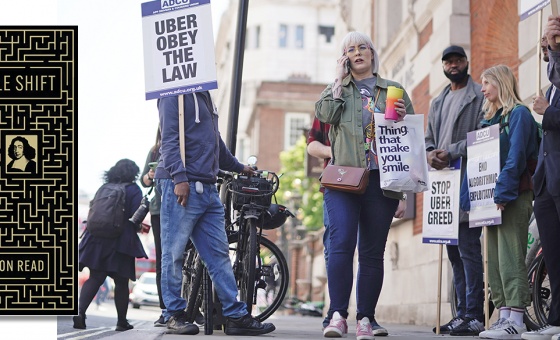This is the last article you can read this month
You can read more article this month
You can read more articles this month
Sorry your limit is up for this month
Reset on:
Please help support the Morning Star by subscribing here
WITH so much despicable legislation going through Parliament it would not be surprising if the Subsidy Control Bill hasn’t been at the forefront of people’s concerns.
It isn’t a vicious attack on civil liberties like the Police, Crime, Sentencing and Courts Bill, nor is it undermining basic rights to citizenship as in the Nationality and Borders Bill, but it is still an important piece of legislation.
Subsidies are an important part of how the so-called free market operates. Ralph Nader called it “corporate welfare.” Martin Luther King Jnr called it socialism for the rich and capitalism for the poor. The myth of self-sufficient businesses generating wealth and sustaining our economy is of course rubbish.
With all the other government scandals, we should not forget the levels of cronyism that occurred during the response to Covid.
At a minimum, millions of pounds were milked to line the pockets of the government’s friends. But we shouldn’t think that this has only happened recently.
The banking crisis saw a massive handout to big business justifying the vicious attack on working people, driving down income and driving up poverty.
Subsidies can take the form of grants, loans, tax breaks, awarding contracts, and any number of other routes. But it also includes subsidising low pay through working tax credits to enable employers to get away with poverty-level wages.
The Subsidy Control Bill replaces the rules on subsidies that existed under the EU, but instead of repatriating control to the devolved governments, it lays down the principles which must apply for approving subsidies for the whole of the UK, including in areas that are devolved such as agriculture and fisheries, energy and the environment and economic development.
The government claims that the Bill gives freedom to offer subsidies, but those freedoms are constrained by the Westminster government’s policies rather than by those of the devolved governments.
Even after more than 20 years of devolution, the Westminster government doesn’t seem to understand — or, perhaps more accurately, does not support — the purpose of devolution.
The Westminster government claims that it has had discussions with the devolved administrations, but both the Welsh and Scottish governments say they have had no opportunity to engage on the details of the Bill.
Clearly the government’s intentions are to retain an iron grip on economic policy throughout the UK and to prevent, where it can, devolved governments adopting alternative economic strategies which could be less favourable to big business.
The Internal Markets Act, the Subsidy Control Bill and the green paper on public procurement are designed to allow the Westminster government to make direct interventions into devolved economies.
If a devolved government wants, as a matter of urgency, to intervene to rescue an important plant it will have to go through a UK minister to get approval for a streamlined route which will then be laid before the UK Parliament.
There is no valid reason why ministers from devolved governments should not be able to lay such schemes before their own parliaments.
Schemes can also be delayed by applications, perhaps from a competitor, for a cooling off period. Devolved governments will not be able to overrule any standstill even if it impacts on their own economic or industrial policy plans.
Both the Welsh and Scottish governments have denied legislative consent for the Bill. One reason is that the secretary of state for business is not even required to talk to the devolved governments if he or she does not deem it appropriate, let alone take their positions into account.
There is particular concern that areas of devolved competence are explicitly mentioned in the Bill without giving a voice to the devolved administrations.
In the EU, the WTO and the trade and co-operation agreement, agriculture is treated separately from general subsidies.
The needs in different parts of the UK differ and it would be obvious to most people that the devolved administrations should make their own provision, but governing principles have been centralised.
Energy and the environment are devolved, and different parliaments have announced their own climate change goals.
The use of subsidies may play an important role in achieving these goals. Again the Bill will make centralised policies.
The minister moving the Bill in the House of Lords stated that “for the first time, local authorities, public bodies and the devolved administrations in Scotland, Wales and Northern Ireland will be empowered to decide for themselves if they can issue taxpayer-funded subsidies” but he went on to clarify that this will be “by following a set of UK-wide principles.”
They will have the freedom to act but only in the constraints set down by the Tory government.
The devolved governments have different political perspectives. Wales has a government committed to ethical employment practices.
It would require businesses seeking subsidies to demonstrate fair working practices including the right of employees to join a trade union.
The SNP is of course committed to staying as near as possible to EU rules even though it often claimed these restricted its ability to intervene on subsidies and procurement.
The Scottish government’s explanation for denying legislative consent states the Bill affects devolved areas of economic development. The same of course could be said of the EU.
Amid all the turmoil of the Tory government around partygate, Covid rules, tax hikes, interventions in the Ukraine, we should not lose sight of the plans it has for shaping our economy.
It is not against subsidies. Far from it. It simply wants to direct those subsidies in a particular way. It does not want devolved governments deviating from the Tories’ central policy.
We started down the road of devolution while part of the EU. If that had not been the case, there would of necessity have been discussions about how the four nations shared power.
If the UK is to stay together it will have to involve a change in relationships. It must involve sharing sovereignty between the nations, but there is still little evidence that this government understands or has any sympathy with that.
Pauline Bryan is a Labour peer and convener of the Red Paper Collective Scotland.











